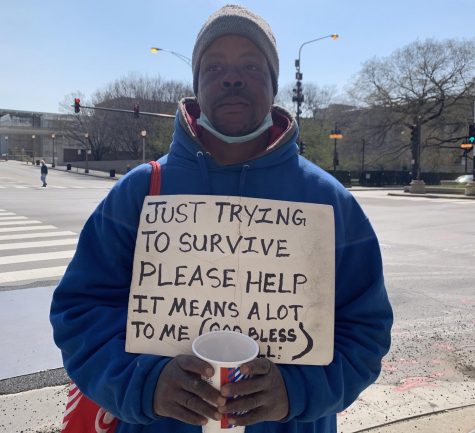Surviving on the streets: Chicago supports panhandler population during pandemic
June 29, 2020

Editor’s Note: This story was reported over the past three months.
On the corner of Wabash Avenue and Washington Street downtown, Arthur Epps III sat on a cardboard box with a sign that read “anything helps” and a plastic cup placed at a safe distance.
For Epps, panhandling—collecting money from people on the street—has become more complicated with rising concerns about health during the coronavirus pandemic, which has resulted in fewer people on the street and consequently, fewer contributions to his plastic cup.
Epps said he is afraid of contracting the coronavirus, or COVID-19, due to his reliance on donations from passersby, as it is mainly spread from person-to-person.
“I use hand sanitizer every day and try to stay clean,” Epps said in early May. “As clean as I can living on the streets during this pandemic.”
Nearly four months ago, he said he was staying at a shelter in Chicago when he noticed the staff was getting sick. After he tested negative for COVID-19, Epps left the shelter to protect himself.
Now back on the streets, Epps said he is trying to make enough money to travel to Phoenix, Arizona, and live with his sister. But the current situation has caused him to make less money, eat less and rely on strangers for food.
“It’s hard not to accept food,” Epps said. “But you are thinking in the back of your mind, ‘What if they got the [coronavirus]?'”
Burke Patten, a senior communications associate at The Night Ministry, an organization that helps people battling poverty and homelessness, said the ministry provides healthcare, food and necessary supplies such as hygiene products, tents and sleeping bags for people panhandling or living on the streets.
The ministry has a health outreach bus with nurse practitioners and a street medicine team who do blood pressure tests, temperature checks and screenings for COVID-19, Patten said.
They also provide information about symptoms, the importance of social distancing, where to go for medical attention and transportation to medical facilities.
“If you’re living on the streets, it’s not as easy to practice social distancing,” Patten said. “But we try to tell people what the symptoms are and what they can do to protect themselves.”
Jackie Caldwell, a panhandler, said she does not have a primary doctor and does not know where she would go if she were to get sick.
Caldwell, who is a senior living on the Southwest Side, said she panhandles to make extra money because her Social Security check is not enough. Due to the pandemic, she said she is not making much money because “not many people are around.” She said she panhandles every day but does so cautiously.
“I stay away from people. I don’t get too close to people because that’s bad,” Caldwell said in early April. “I might catch it.”
Wearing a mask on the corner of Michigan Avenue and Monroe Street, panhandler Levi Henderson said in April he is afraid of catching the virus. The pandemic has profoundly affected him, he said, and people in a similar situation really need help.
Pedestrian traffic downtown is expected to gradually improve since Illinois began phase four of its reopening plan on Friday, June 26, but it will still take some time for activity to return to pre-pandemic levels. On Columbia’s campus, designated employees also began returning to work on Friday and summer school students will be permitted to return to campus on Monday, July 6.
Ronald Sodini, associate vice president of Security at Columbia, said it is best for students to help panhandlers by donating to organizations that support them or by volunteering. The school’s policy recommends students do not engage in any financial transactions on the streets, he said.
In early May, Epps lit a cigarette and adjusted the blanket covering his legs, as he said we must get rid of the virus before it destroys us all.
“People are spooked,” Epps said. “People are real scared out here. It’s crazy to see everybody with masks. I praise the Lord that I haven’t gotten sick.”







